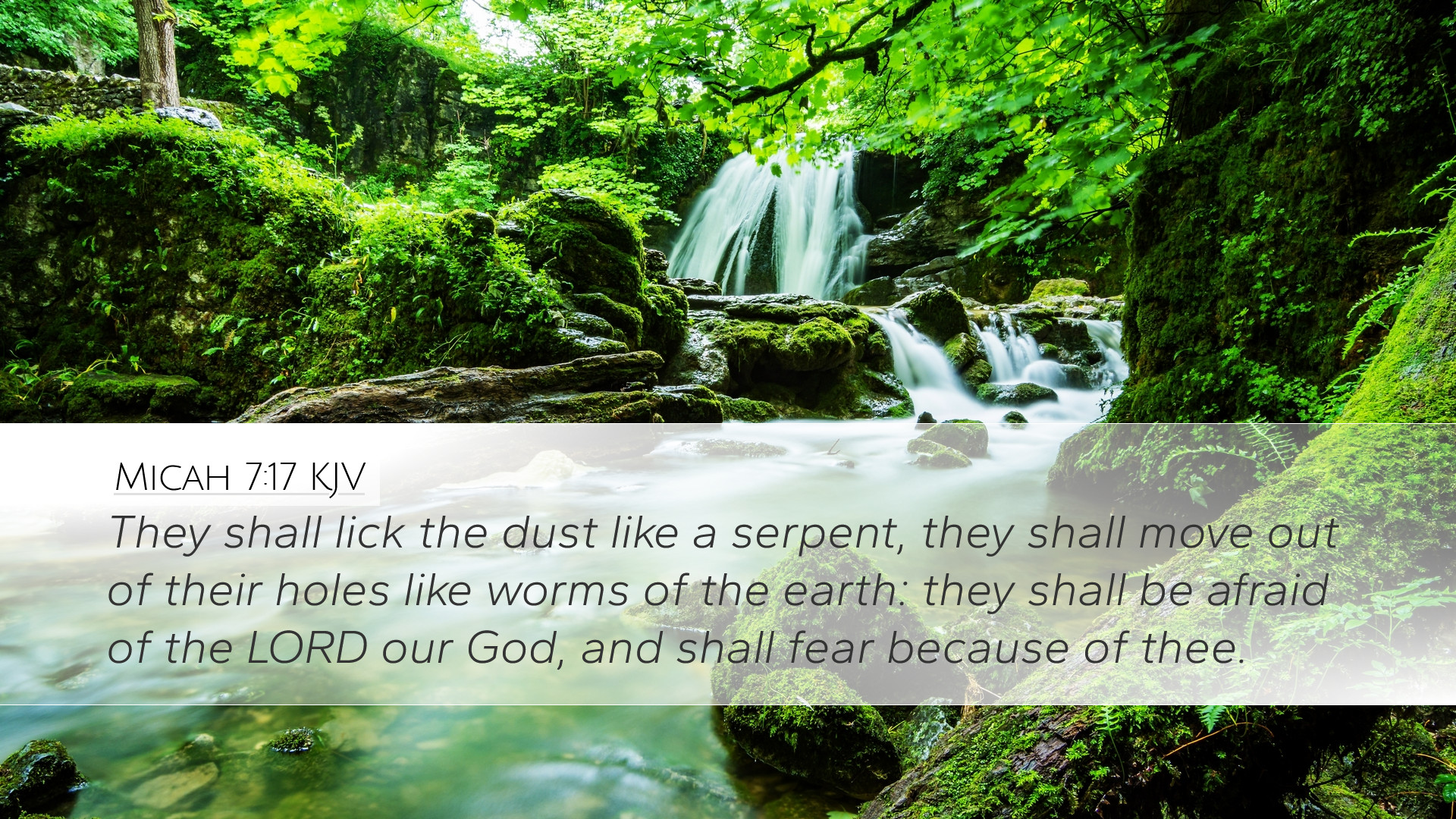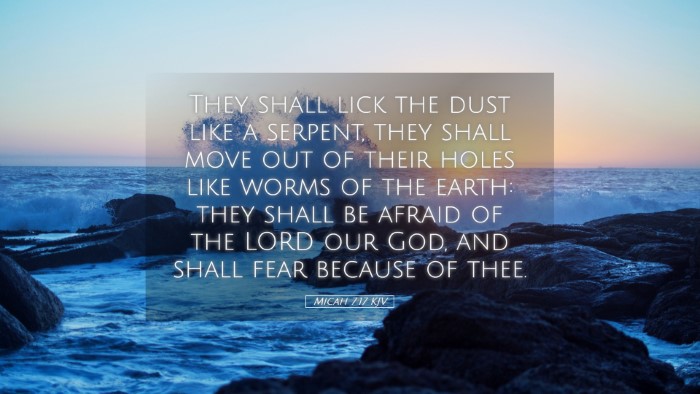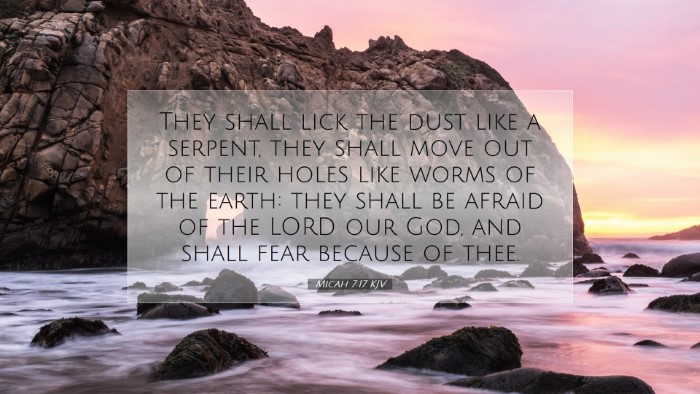Old Testament
Genesis Exodus Leviticus Numbers Deuteronomy Joshua Judges Ruth 1 Samuel 2 Samuel 1 Kings 2 Kings 1 Chronicles 2 Chronicles Ezra Nehemiah Esther Job Psalms Proverbs Ecclesiastes Song of Solomon Isaiah Jeremiah Lamentations Ezekiel Daniel Hosea Joel Amos Obadiah Jonah Micah Nahum Habakkuk Zephaniah Haggai Zechariah MalachiMicah 7:17
Micah 7:17 KJV
They shall lick the dust like a serpent, they shall move out of their holes like worms of the earth: they shall be afraid of the LORD our God, and shall fear because of thee.
Micah 7:17 Bible Commentary
Bible Commentary on Micah 7:17
Verse: Micah 7:17 - "They shall lick the dust like a serpent; they shall move out of their holes like worms of the earth: they shall be afraid of the LORD our God, and shall fear because of thee."
Introduction
The passage from Micah 7:17 is laden with profound implications regarding the nature of God's judgment and the response of the nations to His authority. Micah, as a prophet, speaks during a tumultuous period in Israel's history, and this verse reflects both the fear of God and the inevitable subjugation of the enemies of His people. In this commentary, we will explore insights drawn from notable public domain commentaries, which illuminate the depth of this verse.
Contextual Background
Micah prophesies during a time when Israel is facing both moral decay and impending invasion. His words serve as a warning to both Israel and the surrounding nations, reiterating God's sovereign plan, judgment, and eventual restoration.
The Theme of Judgment
Matthew Henry: In his commentary, Henry outlines the theme of divine judgment present in Micah. He interprets "lick the dust like a serpent" as a vivid picture of humiliation that awaits Israel’s foes. Serpents, often viewed as lowly creatures, reflect total submission. The metaphor of serpents and worms illustrates the severe degradation these nations will experience in the wake of God's wrath.
The Response of the Nations
Albert Barnes: Barnes emphasizes the fear that the nations will experience, stating that their acknowledgment of the LORD's supremacy leads them to "move out of their holes" in a state of terror. This indicates a reversal of power; those who once oppressed Israel will now tremble before their God. The transformation of fear into reverence for the LORD is a critical point of analysis in understanding this verse.
Symbolism and Imagery
Adam Clarke: Clarke remarks on the rich imagery used in this verse. He suggests that the act of "licking the dust" symbolizes ultimate defeat and the acknowledgment of God’s power over creation. The terms "serpent" and "worm" are particularly significant, suggesting that those who rise against God's people will be brought low; their proud ambitions will end in shame and fear.
Theological Implications
This verse contains profound theological implications regarding God's nature as a just ruler. The impending judgment of the nations serves as a foreshadowing of the ultimate triumph of divine justice and the subjugation of evil.
On Divine Sovereignty
Matthew Henry: He notes that the idea of God striking fear in the hearts of those who oppose Him reinforces His sovereignty and omnipotence. The contrasting images of might and meekness highlight the unexpected nature of God's ways; He often works through weakness to demonstrate His strength.
Human Response to Divine Fear
Albert Barnes: Barnes highlights how fear of God can lead to repentance and recognition of sin. The fear described in this verse can be interpreted as a catalyst for future nations to turn towards the Lord. It reflects a moment of realization for the oppressors; their fear is a step towards understanding their place in the divine order.
Hope for Restoration
Though Micah 7:17 emphasizes judgment, it also hints at restoration. In the midst of fear and subjugation, there exists an underlying promise that the recognition of God will allow for healing and renewal among His people.
Conclusion
Micah 7:17 encapsulates profound truths about humanity's relationship with God, highlighting themes of judgment, fear, and hope. Through insights from Matthew Henry, Albert Barnes, and Adam Clarke, we gain a multifaceted understanding of this verse that is particularly meaningful to pastors, students, theologians, and Bible scholars. God’s judgment serves as a reminder of His sovereignty and the ultimate reverence He commands from all creation.
Further Reflections
- Understanding Judgment: Reflections on what it means to exist within the scope of divine judgment and how it shapes our spiritual lives.
- The Nature of Fear: Exploring the potential for fear of God to transform into love and reverence.
- Hope Amidst Judgment: Finding encouragement in God’s commitment to restoration even in times of judgment and despair.


